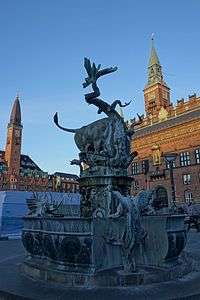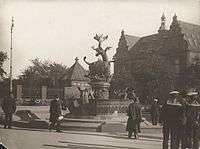Dragon Fountain, Copenhagen

The Dragon Fountain is a fountain located in the City Hall Square in Copenhagen, Denmark. It was designed by Joakim Skovgaard in collaboration with Thorvald Bindesbøll and features a bull in combat with a dragon.
Description

The fountain stands just under 7 metres tall and the basin has a diameter of 3.1 metres.[1] The central motif of the fountain is a bull fighting a dragon. On the edge of the basin sit three water-spraying dragons. Other decorations on the basin are inspired by Ancient Greek ornamentation.[2]
History

The design was originally created as an entry in the competition for a new monument on Amagertorv. Skovgaard conceived the original idea and made the first model in 1889. It was then modified by Bindesbøll before Skovgaard created the final drawings. The competition was not won by Skovgaard and Bindesbøll but by Edvard Petersen and Vilhelm Bissen with their Stork Fountain.[3]

.jpg)
In connection with the Town Hall Exhibition in 1901, which was dedicated to Danish art from before 1890, it was decided to realize Skovgaard's and Bindesbøll's old design on the City Hall Square. The project was also supported by Forenignen til Hovedstadens Forskønnelse and the Eibeschütz Grant (Eibeschützlegatet) as well as a few other foundations. The site on the City Hall Square had originally been intended for the Gefion Fountain but this monument was instead moved to Nordre Toldbod.[4]
The Dragon Fountain's first part, without the central animal group, was inaugurated in 1904. It was vigorously criticized by the press and became colloquially known as "The spittoon" (Danish: Spytbakken) among the residents of Copenhagen.[5]
.jpg)
The fountain was surrounded by a low, outer basin in 1908. A plaster model of the central composition was on display in the fountain from 31 May until 7 June 1915. A bronze cast was later created in Lauritz Rasmussen's bronze workshop and the fountain was finally inaugurated on 4 June 1923.[6]
In 1954, H. C. Andersens Boulevard, until then known as Vestre Boulevard, was expanded. The Dragon Fountain had to be moved 25 metres and the outer basin was removed. In 1974, it was placed on Brønshøj Torv but removed again in 2001.[7] It has been proposed to move the fountain again to a new location on the square with the outer basin.[8]
See also
References
- ↑ "Dragespringvandet". Copenhagen Municipality (in Danish). Retrieved 24 May 2015.
- ↑ "Dragespringvandet". Visit Copenhagen (in Danish). Retrieved 12 February 2015.
- ↑ "Dragespringvandet". Selskabet for Københavns Historie (in Danish). Retrieved 24 May 2015.
- ↑ "Gefionspringvandet". Selskabet for Københavns Historie (in Danish). Retrieved 24 May 2015.
- ↑ "Prøveopstilling af en gipsmodel af Dragespringvandet, dragens kamp med tyren, som den oprindelig var tænkt". caeggen.dk (Museum of Copenhagen) (in Danish). Retrieved 24 May 2015.
- ↑ "1923". Selskabet for Københavns Historie (in Danish). Retrieved 24 May 2015.
- ↑ "Dragon Fountain". Københavns Kommune. Retrieved 2016-07-29. (Danish)
- ↑ "17. Drøftelse: Dragespringvandet på Rådhuspladsen (2011-62324)". Copenhagen Municipality (in Danish). Retrieved 24 May 2015.
External links
| Wikimedia Commons has media related to Dragon Fountain, Copenhagen. |
Coordinates: 55°40′33″N 12°34′07″E / 55.67570°N 12.56858°E